Call for updated Arab plan to better promote Palestinian cause as social media, pandemic changes information industry 17/6/2021 (See Translation in Arabic Section) Sydney - M E Times Int'l: The opening session of the 51st session of the Council of Arab Information Ministers was held at the headquarters of the General Secretariat of the League of Arab States in Cairo, headed by Sudan. Arab information ministers and heads of participating delegations held a closed consultative meeting on the issues presented at the Arab Ministerial Council, especially regarding proposals on developing an Arab strategy to deal with the Covid-19 pandemic. The meeting discussed a draft agenda prepared by the Executive Office in its session, which includes 15 items dealing with Arab media. THE Secretary-General of the League of Arab States, Ahmed Aboul Gheit, has called for work to vigorously update the plan for Arab media action abroad, stressing the need for the Palestinian issue to be one of the main axes of the action plan after its update. He considered that the latest round of conflict between the Palestinians and Israelis in May, and the brutal attacks on the Gaza Strip, “revealed once again that the battle with the occupation is taking place on screens, newspaper pages, and social media pages, just as it is fought in the field in the face of settlers and the occupation forces”. Aboul Gheit said “although Israeli propaganda has always succeeded in portraying the victim as an aggressor and the owner of the case as if he were a practitioner of violence and terrorism, we have recently noticed a qualitative change in the prevailing (narrative) about Palestine during the recent confrontations.” He pointed out that “for the first time, concepts such as “ethnic cleansing” and (apartheid) were widely used to describe what taking place in the occupied Palestinian territories. Aboul Gheit stressed that there is a need to benefit from the wave of international sympathy and media momentum with the Palestinian cause, whether through traditional media or social media, which play a central role in mobilizing supporters, especially in young age groups. He also pointed out that the Covid-19 pandemic had emphasized the importance of the media’s role in the life of Arab citizens, especially in times of crisis, explaining that “the credibility of the media and their ability to play an educational role in transmitting information and messages is an important factor in dealing with the crisis. KUWAIT’S STANCE 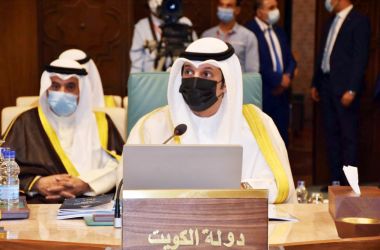
The delegation of Kuwait headed by the Minister of Inf. Al-Mutairi
Kuwaiti Minister of Information and Culture and Minister of State for Youth Affairs Abdul Rahman Al-Mutairi affirmed that Kuwait fully believes in the importance of supporting the Palestinian cause at all regional and international levels, including in the media. Al-Mutairi explained that “this is a firm policy of Kuwait, the leadership and people, until the brotherly Palestinian people obtain their inalienable rights to establish their independent state with Al-Quds Al-Sharif as its capital.” He reiterated Kuwait’s “full solidarity with the brotherly Palestinian people towards the attacks and violations they are witnessing at the hands of the Israeli occupation forces, especially the recent aggression against the city of Jerusalem and the occupied Palestinian territories.” In this context, he referred to the important role of the Arab media in defending the issues of the Arab nation, especially the Palestinian cause, “the main and pivotal issue of the Arab and Islamic worlds.” Al-Mutairi said, “The Arab reality, with its very important developments at all levels, requires us to develop innovative ideas to develop Arab media mechanisms so that they can address our Arab peoples and convey our issues to the outside world with correct, logical and purposeful content and in creative ways.” He explained that Kuwait stresses “the importance of the Arab media, both traditional and modern, investigating the abstract truth in every media production as the only way to combat rumours and misinformation and spread the truth,” noting that this matter “necessitates us to adopt an executive plan to implement the (media honour charter).” Al-Mutairi pointed out that the growth of societal events (global and local), political, health, social, cultural and others, led to the multiplicity of roles played by the media, which contributed to the expansion of its development goals. He explained that this matter “made the Kuwaiti government work hard to develop a comprehensive, participatory and consensual media strategy for the years 2021-2026 as a step towards (a pioneering sustainable media) in the industry of meaningful content.” Minister Al-Mutairi said, “We are required for comprehensive and integrated media cooperation to enhance the path of cultural and media thought and the unity of the Arab ranks to be a global media platform, a maker of a targeted media message and a spreader of the meanings of peace and humanity.” Minister Al-Mutairi expressed his thanks to the Minister of Commerce and Minister of Information in charge of the sisterly Kingdom of Saudi Arabia, Dr. Majid bin Abdullah Al-Qasabi, for their efforts during the Kingdom’s presidency for the work of the previous session of the Council of Arab Information Ministers. He also congratulated the Minister of Culture and Information of the sisterly Republic of Sudan Hamza Balloul on assuming the presidency of the current session and thanked the Secretary-General of the League of Arab States, Ahmed Aboul Gheit, and staff of the General Secretariat for their work. OMAN AT THE 51ST SESSION 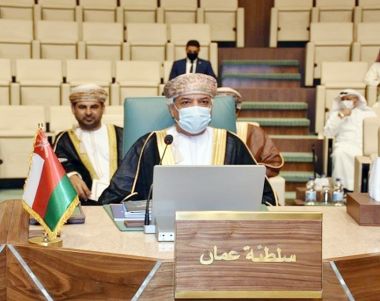
The delegation of Oman headed by Ali bin Khalfan Al Jabri The Sultanate, represented by the Ministry of Information, participated in the 51st ordinary session of the Council of Arab Information Ministers, headed by Ali bin Khalfan Al Jabri, Undersecretary of the Ministry of Information for Information. Topics on the agenda included an Arab media strategy and “the plan for Arab media action abroad” and what is related to the centralisation of the Palestinian issue in the Arab media agenda. The ministers will discuss ways to modernise Arab media action in addressing terrorism and extremism, and the production of multi-dimensional media content to contain stereotyped projections and prejudices. His Excellency Ali bin Khalfan Al Jabri, Undersecretary of the Ministry of Information said that the Arab media plays a functional role considering the developments that the world is going through to bring Arab countries closer. His Excellency said that from this point of view, the adoption of the program of action of the media map for sustainable development and the inclusion of media in the Arab educational curricula are important issues on the agenda which fall into the framework that focuses on development and construction. . His Excellency explained that the agenda of the Arab information ministers attaches great importance to the Arab media action plan, noting the importance of dealing objectively with social and intellectual issues, and addressing them in the media. BOOST FOR LEBANON 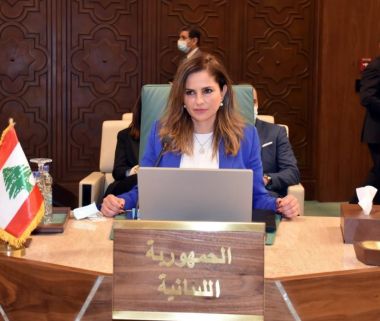
The delegation of Lebanon headed by the Minister of Inf. Ms Abdel Samad
Caretaker Minister of Information, Dr. Manal Abdel Samad, welcomed the “unanimous approval of the Council of Arab Information Ministers on the two proposals I submitted to allocate the “Beirut Prize for Humanity” and to consider Beirut the capital of Arab media for 2023,” stressing that “these two achievements constitute great and strong support for Lebanon.” in the face of multiple and exacerbating crises. Abdel Samad noted that during the meeting of the Council of Arab Information Ministers, “two recommendations were approved. The first is to allocate an award in the name of the Lebanese capital, Beirut, which will be dedicated as a kind of appreciation to media professionals and journalists working in newspapers, audio-visual, print and digital media, who prepare media, journalistic or even dramatic materials that are distinguished and distinguished, support humanitarian work, and consider impartiality, objectivity and professionalism. She considered that “the approval of Lebanon’s proposal submitted by the Ministry of Information, considering Beirut the capital of Arab media for 2023 represents great moral support for the Lebanese capital, especially in light of the crises that Beirut experienced, especially the explosion in the port in August as well as the difficult conditions faced by the media. Abdel Samad said: “This proposal, which was approved by the Arab Ministers of Information, is an important moral gesture in the field of helping and informing Lebanon, and that the Lebanese media will once again be the focus of the attention of all Arab as well as Western countries, and restore its prestigious position, influence and strong role as a news and cultural beacon.” She touched on the “positive media” initiative that she had recently launched, noting that “the media can be a tool of demolition or construction in societies,” stressing that “destructive media does not benefit and does not serve countries and peoples with anything, but on the contrary serves the enemies of Arab countries.” and hit their economies. She explained that “it is absolutely necessary to strengthen the roles of the positive media in light of the state of fragmentation, disagreements and existing crises, so that it can highlight the aspects that will transform challenges into opportunities for success, especially at the level of the trend towards a productive economy and development projects that push advancement and progress.” Abdel Samad praised “the great Arab support for Lebanon, which was shown by the Egyptian and Arab ministers and officials whom she met during the meeting of the Council of Arab Information Ministers and on the sidelines of the meeting’s work in multiple and intense bilateral meetings.” She said: “I sensed great support for Lebanon, and sincere sympathy from representatives of all brotherly Arab countries. We appreciate the Arab brothers for standing with us on many occasions, and we know that we can bet on new support. She added: “I also felt great encouragement for us to persevere and stand firmly in the face of the crises and tribulations we are exposed to in Lebanon, as well as praising some of the positions and decisions that aim to help find the necessary solutions to problems and overcome crises and difficulties. We are trying to propose and develop solutions despite difficult circumstances and to work to find Our country is in crisis, but the main obstacle remains the absence of a current government with full powers.” KUWAITI-EGYPTIAN MEDIA INITIATIVE 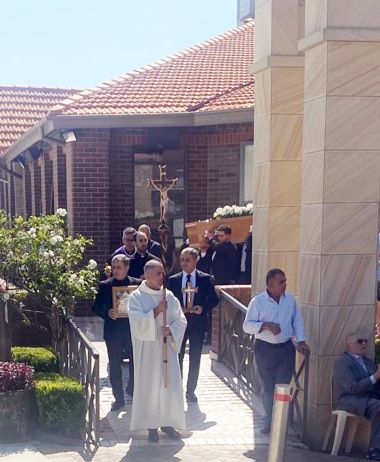
Minister Al-Mutairi during his meeting with Karam Gabr the head of SCMR Kuwaiti Minister of Information and Culture and Minister of State for Youth Affairs Abdul Rahman Al-Mutairi agreed with the head of the Supreme Council for Media Regulation in Egypt, Karam Gabr, to launch an Egyptian-Kuwaiti initiative to support media innovators in the two countries. During Minister Al-Mutairi’s meeting with journalist Karam Jabr in Cairo, in the presence of Kuwait’s Ambassador to Egypt Mohammed Al-Dhuwaikh, the minister praised Kuwaiti-Egyptian media relations, describing them as “very distinguished, extending for tens of years and still, within the framework of the historical and rooted relations in various fields between the two brotherly countries.” He stressed the importance of the media’s role as “the link” between the various Arab countries, especially Egypt, explaining that “strong media is able to face the challenges facing the Arab world, in a way that raises awareness among young people of the dangers facing their countries.” For his part, Gabr expressed his hope that there will be Egyptian-Kuwaiti cooperation during the coming period, which will be reflected in the media policies between the two countries and work to extend the media bridges of consultation, communication, dialogue and exchange of visions on various issues that serve common interests. Jabr pointed out that the Arab nation is facing an “electronic media challenge,” expressing his belief in the importance of changing the media from its traditional methods, “because the traditional media no longer affects public opinion much after the emergence of social media.” As for Ambassador Al-Dhuwaikh, he stressed the importance of having a Kuwaiti-Egyptian media forum through which visions and experiences would be exchanged at all levels, “because there is a rich legacy in relations between all media and cultural institutions in the two countries.” He urged the development of creativity and joint communication between Kuwait and Egypt and the investment of youth competencies in them to reach a better future, stressing the importance of having a “distinguished” relationship between young people in the two countries. During the meeting, it was agreed that a working group would be formed from both sides to immediately start developing a working paper and strategy for the Kuwaiti-Egyptian initiative. Minister Al-Mutairi also met with the editor-in-chief of the Middle East News Agency, several media professionals, and officials of Egyptian newspapers. VISIT TO EGYPTIAN CIVILISATION MUSEUM 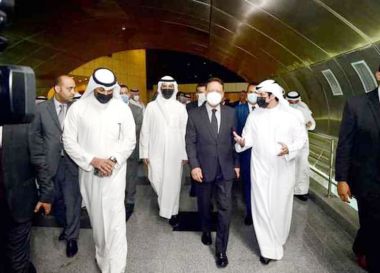
Arab Information Ministers visited the National Museum of Egyptian Civilization in Cairo, at the invitation of the Chairman of the Supreme Council for Media Regulation, writer Karam Jabr, where they toured the sections and departments of the museum. The tour began by visiting the section of the Pharaonic royal mummies then inspecting the rare antiquities included in the museum that talks about the Nile, writings, culture, society, beliefs and ideas. The Arab Ministers of Information expressed their admiration for the museum and the ancient Egyptian civilization and praised its antiquities and various departments. |


